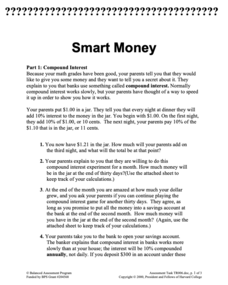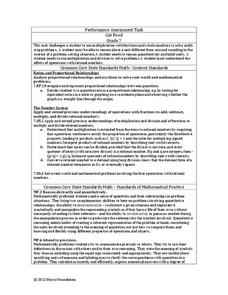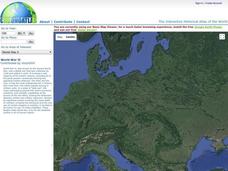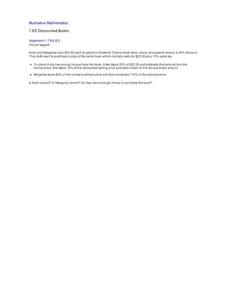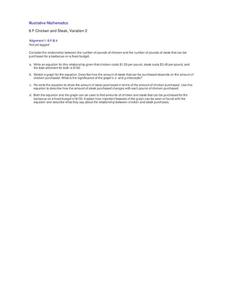Illustrative Mathematics
Money in the Piggy Bank
It's time to crack open that piggy bank and see what's inside. First, count up the pennies, nickels, dimes, and quarters, identifying what fraction of them are dimes. Then calculate the total value of the coins, writing another fraction...
Illustrative Mathematics
Sharing Prize Money
When three classrooms are to split up prize money, your mathematicians must find the percentage that each class deserves and calculate the total amount. There is an option to use a calculator and practice rounding.
Concord Consortium
Smart Money
Watch the money grow daily. Scholars tackle a problem to determine how much money they will have if a dollar grows at 10 percent compounded daily after a month. Using that knowledge, learners notice the difference between varying savings...
Mathed Up!
Money Problems
Mo' money, mo' problems! But don't worry, here is an assessment that proves to young mathematicians that they can solve actual money problems. The resource includes 11 money problems involving addition, subtraction, multiplication,...
Illustrative Mathematics
Margie Buys Apples
One of the most common, everyday applications of math is dealing with money. This single problem calculating how much change Margie receives is more involved than it appears at first glance. An understanding of how fractions and decimals...
California Education Partners
School Supplies
Make sure to get enough for everyone. The three-part assessment task requires scholars to calculate with decimals. Learners determine the cost of school supplies and whether the teachers have ordered enough. The assessment is the sixth...
Los Angeles County Office of Education
Assessment For The California Mathematics Standards Grade 6
Test your scholars' knowledge of a multitude of concepts with an assessment aligned to the California math standards. Using the exam, class members show what they know about the four operations, positive and negative numbers, statistics...
Mathed Up!
Percentages
Review a percentage of math skills. Designed to review for the General Certificate of Secondary Education Math assessment, the resource provides practice with a variety of percent problems. Items provide pupils problems ranging from...
Charleston School District
Pre-Test Unit 4: Linear Funcitons
Let your classes show you what they know! Use this pre-test to assess the current knowledge of your learners. The assessment includes all pre-algebra concepts related to functions: writing and graphing linear relationships, comparing...
Curated OER
Classroom Supplies
Challenge young mathematicians to buy classroom supplies by staying within the means of a $1,000 budget. The mathematical activity provides learners with the opportunity to decide what items from the supply list would benefit a class of...
Balanced Assessment
Cost of Living
Math scholars investigate the cost of living in Hong Kong compared to Chicago but must first convert the different types of currency. They then choose a type of graph to compare different spending categories and finish the activity by...
Mathed Up!
Utility Bills
What is the total cost? Provided with seven problems, pupils determine the total cost for utilities. Scholars determine the amount of the utility used and determine the cost based upon the given unit rate. The resource is part of a prep...
Curated OER
Compounding with a 5% Interest Rate
The balance in an account continuously compounding interest is the context of this engaging task. Your young accountants will investigate the ending balance in an account as they compound the interest more and more. Learners write the...
Noyce Foundation
Cat Food
Determine the right mix of cans of cat food. The resource consists of an assessment task to determine the cost to feed two cats for a specific number of days and requires scholars to interpret remainders within a context....
Concord Consortium
Summertopia
What if the unit of money changes tomorrow? Would you be prepared? Learners calculate currency conversions using fictional units of money. The fictional unit's base is 60 rather than 100, which can connect to time or even degrees.
Mathed Up!
Conversion Graphs
After watching a video on conversions, learners convert meters to feet, dollars to pounds, pounds to Euros, gallons to liters, and kilometers to miles. Then, they graph the conversion changes onto graph templates.
Illustrative Mathematics
The Price of Bread
As part of an initiative to strengthen our young adults' financial understanding, this problem explores the cost of bread and minimum wage since the 1930s. Learners are asked to find the percent increase from each year and compare it...
Charleston School District
Pre-Test Unit 3: Functions
How does an input affect an output? Assess your learners' ability to answer this question using this pre-test. Scholars answer questions about the basics of a function. Topics include determining if a table or statement represents a...
Curated OER
Doubling Your Money
Your young financial geniuses explore the Rule of 70 as they analyze the exponential function that models the doubling time of investments.
Houghton Mifflin Harcourt
Simple and Compound Interest
Your learners will get lots of practice calculating simple and compound interest by the end of this lesson. Simple explanations and examples lead learners through the concepts and steps of calculating simple and compound interest...
Illustrative Mathematics
Discounted Books
Adolescents love to shop, especially when an item is discounted. Here, shoppers only have a set amount of money to spend. Will they be able to make a purchase with the discount and tax added in? Percent discounts can be calculated...
Illustrative Mathematics
Chicken and Steak, Variation 2
Many organizations put on barbecues in order to make money. In a real-world math problem, the money allotted to purchase steak and chicken at this barbecue is only one hundred dollars. It is up to your potential chefs to figure out how...
Illustrative Mathematics
Buying a Car
Teenagers love to think about driving and buying their first car. The intent of this resource is to create an equation for the list price of a car and add the appropriate state tax. Once your teens understand the calculation, ask them to...
EngageNY
The Difference Between Theoretical Probabilities and Estimated Probabilities
Flip a coin to determine whether the probability of heads is one-half. Pupils use simulated data to find the experimental probability of flipping a coin. Participants compare the long run relative frequency with the known theoretical...


